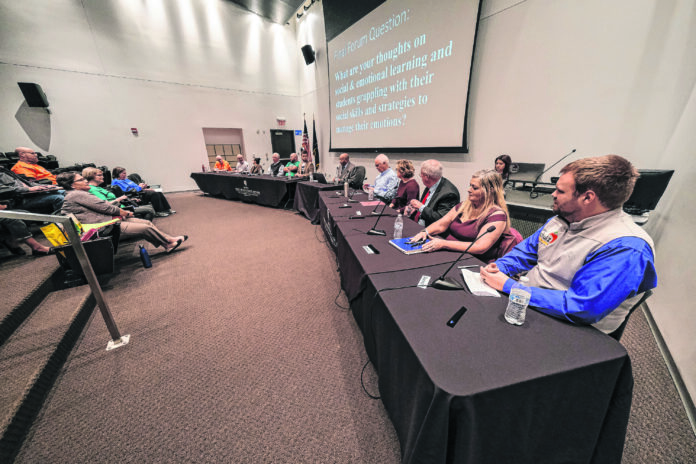
COLUMBUS, Ind. — Teacher pay, social emotional learning and censorship were among topics discussed during a Bartholomew Consolidated School Corp. board candidate forum hosted by IUPUC’s Office of Student Affairs. All 11 candidates on the Nov. 8 ballot attended and talked before an audience of about 150 people at the Columbus Learning Center.
IUPUC officials said that they hope to post an audio recording of the forum at iupuc.edu/live by the end of the week, or Monday at the latest.
Jason Major, Anakarina Hurtado, and David Vincent are running for District 1. District 2 incumbent Rich Stenner is opposed by Roy West. Dale Nowlin and Eric Grow both seek the District 4 seat. Four candidates are running for District 6: incumbent Kathy Dayhoff-Dwyer, Mark Douglas, Cheryl Miles-Vieth and Logan Schulz.
Each candidate had 90 seconds to present his or her platform and was given the same amount of time to answer each question. There were four questions in total, including one that centered on censorship.
In response to a question about censorship in the classroom, Major, who was the final candidate to respond to the question, emphasized the importance of “age-appropriate” materials. He then read a sexually explicit passage from a book that he said is included in Columbus East High School’s library, though he did not provide its title.
“Is this acceptable in our schools?” he asked afterward.
Schulz and Grow similarly said library materials should be age appropriate. West said this should be true of books and topics that are taught in the classroom, though he added that he would listen thoughtfully to those who disagree with him.
Vincent, who’s running against Major, said that while he’s not for banning, he believes in providing age-appropriate materials to students. He then cited a story that Corrie Ten Boom, author of “The Hiding Place,” told about her father.
“He asked her to carry his heavy work bag,” said Vincent. “When she can’t because it’s too heavy, he says that it would be ‘a pretty poor father’ to expect his little girl to carry such a load. He says, ‘It’s the same way, Corrie, with knowledge. Some knowledge is too heavy for children. When you are older and stronger, you can bear it. For now, you must trust me to carry it for you.’”
Douglas said that schools need to focus on going “back to the basics” rather than on politics and that teaching should have a “good moral foundation.”
“We need to get that good moral base back in our schools where we are one nation under God,” he said. “And discipline in our schools. I know that the censorship thing is — it’s something that we have to deal with on an every day basis. But we need to hear from people. We need to hear what their decisions are, what they’re looking for. There’s a lot of controversial things in our school system that I don’t approve of. It should be back to reading, writing and arithmetic and history.”
Miles-Vieth, one of Douglas’ opponents and a former BCSC teacher, said that proposed legislation banning the promotion of certain topics — such as sex, race, ethnicity, religion or national origin — would have a chilling effect on teachers if passed and would affect their ability to teach subjects such as biology, history and health. She added that it would also affect their ability to answer questions from curious students.
“It (censorship) keeps tyrants in power,” said Miles-Vieth. “Neither the right nor the left of American politics should have the right to keep the information from others.”
Hurtado expressed a similar sentiment and said that conversation should be open so that students can develop critical thinking skills. Additionally, community members should trust teachers to follow state standards and pick age-appropriate topics. She also emphasized the importance of providing inclusive materials and added that there are processes in place for concerned parents to keep their own children from checking out specific books.
Education is about “teaching differences,” and it’s important to learn about diverse groups, said Dayhoff-Dwyer. She added that children should talk with their parents about these matters and about censorship itself.
“Hopefully between the parents and the schools and the kids, they can come to an understanding of what it is that they want to learn in school,” she concluded.
Fellow incumbent Stenner said, “Choices about materials, what’s appropriate for what age group, when and where do we make choices that might be viewed as censorship by some to shield or protect kids — in general, I believe decisions like this are best made closest to the students involved and closest to the classroom. I think we need to continue to let decisions like this be made by the students’ teachers, by their parents and by the principal of the building working together.”
Nowlin, a former BCSC teacher and occasional substitute, said that the Indiana Department of Education comes up with state standards. It is then up to schools and teachers to create curriculum based off these standards. He described certain bills proposed during the last legislative session as “micromanagement” of curriculum.
Parents who are concerned about what’s being taught should read the state standards and talk with their teacher and building principal if they have issues with local curriculum, said Nowlin.
For the complete story and more photos, see Friday’s Republic.




